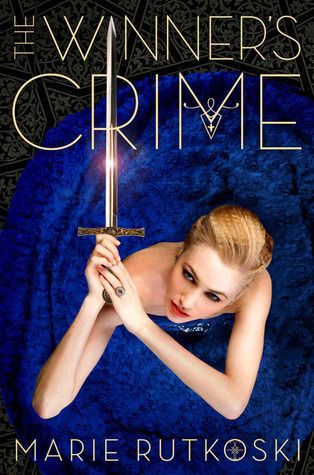"If you won't be my friend, you'll regret being my enemy."
 Title: The Winner's Crime
Title: The Winner's Crime
Author: Marie Rutkoski
Genre: YA Fantasy
Rating: B-
Recommended For: fans of The Winner's Curse and Throne of Glass
Source: library e-book
One-sentence review: I would liken this disappointing sequel to one of my favorite books to a rollercoaster flying off the rails, veering one way and then swerving before it reaches any sort of satisfying speed.
TBR It: Goodreads
Buy It: Amazon
This review contains spoilers for The Winner's Curse by Marie Rutkoski (one of my 2014 favorites!)
In Marie Rutkoski's second installment of The Winner's Trilogy, The Winner's Crime finds Kestrel amidst the politics of Valoria's court after she has bargained for Heran's freedom in exchange for her marriage to the prince of Valoria. With her impending wedding only a few months away, Kestrel does her best to lie to herself about accepting her fate but nonetheless keeps finding herself in sticky situations where there are no good outcomes. Meanwhile, Arin struggles with why Kestrel has chosen to marry the prince as he works as the Governor of Heran under an Emperor who he cannot trust to truly give his people sovereignty.
As you may have noticed, I really struggled to describe this book because the bulk of it was so aimless and disjointed that I didn't know where anything was going or really what anyone wanted. Throughout most of the first 70% of this book I found myself asking, "Where is this going? What are these character's goals?" Is Kestrel's goal to escape her marriage? Escape the evil Emperor? Help Heran? Get Arin back? Survive? One could say it's all of these, but the book was so far from the succinctness of The Winner's Curse that it frustrated me! I might even describe myself as bored while reading this highly anticipated book.
Similarly we find Kestrel and Arin suspicious about unrelated things early on and I can't understand where they got the basis of their suspicions except that it was important for kick-starting the mysterious nature of the story as a whole. Because I questioned why each had their convenient suspicions, I could never get behind what was going on. Especially because, as mentioned, I didn't understand each character's motivations. This whole foundation of the story was way too easy, especially given Rutkoski's subtle but excellent story-telling in the previous book.
Kestrel and Arin's whole love story dynamic is another thing I found lacking in this book. They had such a potent chemistry in the first book missing in this sequel. Every time Kestrel and Arin interact they must pretend their feelings for each other don't exist. This could be an excellent way to build romantic tension, but instead it becomes an itch that Rutkoski never lets us scratch. When both characters finally do acknowledge their feelings (internally at least), the descriptions are so cheesy and forced that I was crushed with disappointment. If someone had told me this was fan fiction, I would believe it! I recognized none of Rutkoski's original subtleties and romantic slow boil from The Winner's Curse. Some have praised this book for taking the spotlight off of romance and focusing more on the story, but I completely disagree. I felt like the romance that did exist was too overwrought and distracting from whatever story Rutkoski intended, especially with the cheesiness of the romantic elements that existed. I would have been more satisfied if Arin and Kestrel never interacted at all throughout the whole book.
I did enjoy a lot of the symbolism and themes throughout. The symbolic use of games to parallel the political game Kestrel and Arin have been playing is one of my favorite parts of this series, especially considering both characters are superior at board games but not so sure about the moves they make in real life. This book expands on betting while playing games, alluding to what Kestrel and Arin are willing to wage in their ultimate game against the Emperor. There are also more subtle symbols, like Arin almost losing his eye to symbolize how blind he is to the moves Kestrel makes. Also, that Arin is experienced at forging weapons but new at making molds shows his inexperience to leading comparatively to his experience fighting all his life. These symbolic elements made the story much more entertaining in a literary sense.
I also enjoyed the theme of giving something away before it is taken from you, which could be linked to the symbolism of games and betting. Kestrel bargained for Arin's freedom knowing that he would be taken from her no matter the outcome anyway. Arin eventually does the same with Kestrel emotionally, despite his anger at her decisions. We also see this theme with other characters (Risha's family, Verex, Jess, etc) that I won't get into lest I give too much away. This idea gave the story more validity to me when I examined it amongst all of the characters.
There's a lot to be said about this book, but it didn't satisfy in the same way as The Winner's Curse. Every time I thought it was headed in a satisfying direction, it never delivered, much to my disappointment. Of course I will continue to read this series to the end, but not with the same furious anticipation I did for this sequel. I hope Rutkoski takes better care to deliver with the conclusion because there is so much I want from these characters and I have hopes a satisfying conclusion will help me make sense of this book.


No Comments Yet, Leave Yours!
Thank you so much for reading my blog! If you leave a comment I will try my best to email you back directly and visit your blog, too! If I can't find a way to get back to you, check back for a reply to your comment. Thanks again and happy reading!!